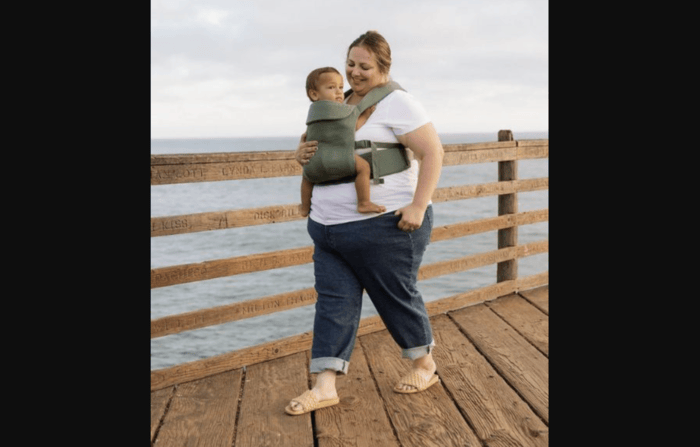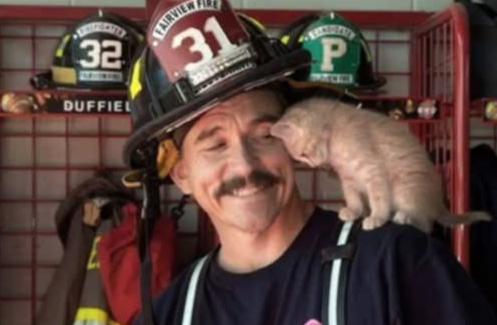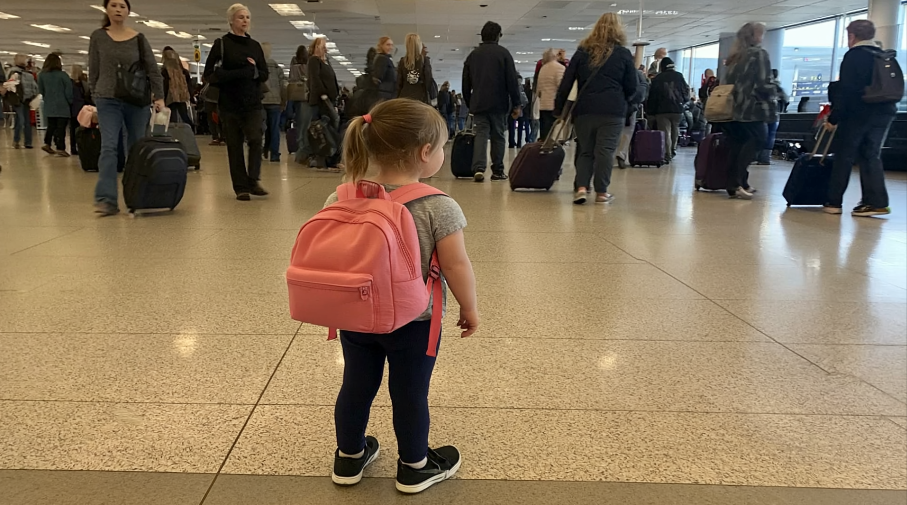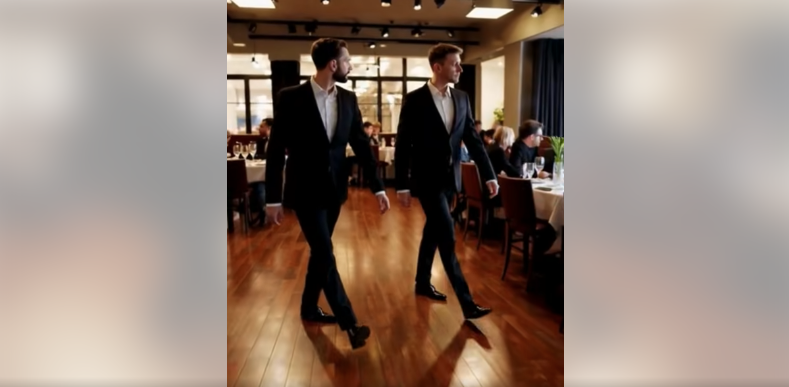It hit me all at once, a sudden, crushing blow.
My son was just three months old when his father abruptly left us.
There was no warning at all.
No conversation whatsoever.
Just a curt note left on the kitchen counter that coldly stated, “I’m not cut out for this.”
So I got cut out instead—from his life entirely, from my own carefully laid plans, from the cherished image of the “perfect family” I had so carefully constructed in my mind.
I cried silently in the shower every single morning, the tears blending with the water, and then forced myself to smile while I held my baby, pretending everything was perfectly fine.
I knew people were watching me intently, scrutinizing my every move.
Especially when I took him out in the carrier—strapped securely to my chest like a second, vulnerable heart.
I vividly remember walking down the sun-drenched boardwalk that first summer, utterly alone.
He was giggling joyously, kicking his tiny feet with boundless energy, and I finally felt strong enough to wear a T-shirt without needing to layer up to hide myself.
It was almost peaceful, a rare moment of calm.
Until I passed a group of boisterous teenagers and distinctly heard one of them whisper something cruel under his breath.
I didn’t catch the full, venomous sentence.
Just two devastating words: “Whale carrier.”
I froze instantly, my body rigid with shame.
For a second, I desperately wanted to disappear, to vanish entirely from their sight.
I almost turned back, almost let the burning shame propel me straight back to my car, to hide.
But my son then turned his little face to me, his smile like pure sunshine, and let out the sweetest, most innocent laugh I had ever heard.
It was as if he was reminding me that I wasn’t just “fat” or “abandoned” or “less than” anyone else.
I was his entire world.
So I kept walking forward, refusing to falter.
I forced a trembling smile onto my face, kissed his soft forehead, and resolutely decided not to give power to people who hadn’t lived a single day enduring the struggles in my skin.
But I won’t lie to you—it deeply hurt. It stayed with me, a bitter taste.
Later that night, when he was finally asleep, I stood in front of the mirror and stared critically at my body.
The visible stretch marks, the persistent softness, the belly that hadn’t quite shrunk back down to its former size.
This was the new version of me, forever changed.
I used to proudly wear a size six.
I used to take immense pride in my slender waistline and how effortlessly clothes draped on my frame.
But now, my old jeans wouldn’t even come past my thighs, stubbornly refusing to budge.
And yet, somehow, I had never accomplished anything harder or more profoundly beautiful in my entire life than growing and giving birth to that precious little boy.
Still, society had an insidious way of making me feel like I’d utterly failed—like I should have “bounced back” by now, effortlessly.
As if my body didn’t have the undeniable right to openly show the fierce battle it had bravely fought.
I joined a few online mom groups, desperately hoping for some much-needed support and understanding.
Some groups were wonderfully kind, filled with relatable women sporting messy buns, enduring sleepless nights, and sharing raw, authentic stories.
Others were less helpful, feeling more like curated Instagram highlight reels cleverly disguised as genuine support groups.
One day, I bravely posted a picture of me and my son at the park.
I felt genuinely good that day, truly happy in my own skin.
But within minutes, a cruel stranger commented, “Maybe focus on losing the baby weight before posting selfies, dear.”
It felt like a physical punch to my gut, stealing my breath.
I wanted to respond with fiery indignation, unleash all my anger.
Instead, I deleted the post immediately, logged off my computer, and cried silently into my pillow until my son woke up, hungry and needing me.
He always, always saved me from those dark, suffocating spirals of despair.
But something profound shifted inside me that week, irrevocably changing my perspective.
I was utterly tired of apologizing for simply existing in my own body.
Tired of constantly feeling like I had to shrink myself, both physically and emotionally, just to be accepted by others.
So I made a solemn promise to myself: I wouldn’t change for anyone’s external approval.
I would grow for me, and only for me.
I started walking more frequently, not primarily to lose weight, but to breathe deeply, to clear my cluttered head, to find solace.
I’d push the stroller through the quiet neighborhood, listening to music that made me feel vibrant and alive again.
Some days were incredibly slow, a painstaking effort.
Some days I barely made it around the block, exhausted.
But I kept showing up, consistently.
Then one afternoon, I passed by a brightly lit local gym.
There was a captivating flyer prominently displayed in the window about a new class: “Mommy & Me Movement—For All Bodies.”
My heart fluttered with a sudden surge of hope.
I walked in, sweaty and incredibly unsure of myself, my anxiety high.
The instructor, a woman in her late forties with beautiful silver-streaked hair and strong, capable arms, smiled warmly at me without a single flicker of judgment in her eyes.
She gently bent down, cooed softly at my son, then said, her voice reassuring, “You’re exactly who this class was specifically made for.”
I almost cried right there on the gym floor, overwhelmed with gratitude.
The first session was hard, physically demanding.
My body ached, my self-confidence wobbled precariously, and my son kept playfully trying to crawl onto my exercise mat.
But nobody in the class cared about any of that.
We laughed together, we moved our bodies, we bonded deeply with one another.
And slowly, gradually, I started feeling less like “just a mom” and more like a woman again, reclaiming my identity.
Still, the judgmental stares continued outside those safe, supportive walls.
At the busy grocery store.
At the bustling coffee shop.
At the public pool where I courageously dared to wear a swimsuit again.
People judged openly. Some whispered maliciously. A few even posted about me online—one particularly hurtful photo ended up on a local Facebook group, mockingly targeting my figure with a horrible caption like, “Some moms need mirrors, stat.”
It broke me completely for a few painful days.
I didn’t leave the house except for absolute necessities, feeling too vulnerable.
I went silent in the online mom groups, withdrawing from their support.
I even skipped the gym class once, my resolve wavering.
Then, a private message popped into my inbox.
It was from a woman named Asha who had seen the cruel Facebook post.
She wrote:
“Hey, I saw what they posted about you. I just wanted you to know I honestly thought you looked absolutely amazing. And more than that, you looked genuinely happy. That’s what truly matters in life. I’m so incredibly sorry that people can be so cruel. If you ever want to talk, I’m here for you, no judgment.”
That single message changed absolutely everything for me.
We met for coffee that very weekend, eager to connect.
She was a single mom too, with a vibrant four-year-old and the same tired eyes that were simultaneously full of boundless love and utter exhaustion.
We clicked instantly, a deep connection forming between us.
She told me candidly about how she’d been mercilessly body shamed for years, relentlessly.
And how one day she bravely decided to take complete control—not by losing weight, but by deliberately building a life so full of purpose and joy that it effectively drowned out all the external noise of negativity.
She had started a powerful blog called Mothers of All Shapes, where she fearlessly shared unfiltered stories and honest photos of real women.
She asked me if I would ever want to be featured on her blog.
I hesitated, my heart pounding in my chest.
But something deep inside me whispered softly, “Say yes, Jules.”
So I did, I bravely said yes.
The day my story went live on her blog, I almost threw up from sheer nervousness and anticipation.
She had included a beautiful photo of me in a flowing red sundress, holding my son close at the beach, laughing freely, my hair wild and windswept.
The caption beneath it read simply and powerfully: “This is strength. This is beauty. This is motherhood.”
And then the comments began to roll in, an overwhelming cascade of support.
Dozens of women shared how they felt exactly the same way, deeply understood.
Some thanked me profusely for my honesty. Some cried tears of relief and recognition.
Some even said they hadn’t worn a dress in years but were courageously going to buy one that very weekend.
That was the pivotal moment I truly realized: my story wasn’t shameful in the slightest.
It was profoundly needed by so many others.
Asha and I started meeting more often, forging a deeper friendship.
Then we added another mom to our growing circle, then two more after that.
Soon, every single Sunday, we gathered joyfully in the park with our coffees, our kids happily running around while we talked openly and lifted each other up with unwavering support.
We affectionately called our gathering “The Table,” even though we usually sat comfortably on picnic blankets on the grass.
It was a sacred space where no one ever had to explain their size, their stretch marks, their sadness, or their quiet strength.
Then something truly unexpected happened, a surprising turn of events.
One evening, I was walking my son home from the park when a car slowed down beside me.
I tensed up at first, instinctively bracing myself for negativity.
Then I recognized the driver—it was one of the teenagers from the boardwalk, the very one who’d cruelly said “whale carrier” that summer.
He rolled down his window and looked genuinely awkward, visibly uncomfortable.
“Hey… uh, I don’t know if you remember me,” he stammered, his voice hesitant.
“I said something really dumb last summer, really thoughtless. My little sister just had a baby recently, and she’s really struggling right now. And I just… I wanted to honestly say I’m sorry for what I said back then. It was cruel and incredibly stupid of me.”
I didn’t know what to say in response at first, taken aback by his sincerity.
But eventually, a genuine smile spread across my face.
“Thank you,” I said, my voice gentle. “I truly hope your sister finds her strength and peace.”
He nodded slightly, a look of relief on his face, and then drove off slowly. It was a small gesture, but it meant something significant to me.
Then another twist to the story.
One day, a new woman hesitantly showed up at The Table.
She looked incredibly nervous, holding a tiny baby barely two weeks old in her arms.
Her name was Priya. She’d been left by her partner, just like me, abandoned and alone.
She hadn’t slept more than two hours at a time in weeks, her eyes were heavy with exhaustion and fear.
I sat down gently beside her, handed her a warm coffee, and said softly, “You’re safe here, Priya. We’ve got you, always.”
That’s when I truly understood something profound and expansive: healing spreads contagiously.
Strength multiplies exponentially.
One single, brave choice creates a beautiful, far-reaching ripple effect.
A year after that painful boardwalk incident, I stood confidently on a small stage at a vibrant community center, giving an empowering talk for Mothers of All Shapes.
I wore the very same red sundress, a symbol of my journey.
My son sat proudly in the front row, clapping enthusiastically with sticky hands and cookie crumbs adorning his shirt.
And I said these powerful words:
“I thought I was completely broken when he left. I thought my body made me utterly unworthy of love and acceptance. But I was never truly broken at all. I was simply rebuilding myself, piece by piece. Every scar, every soft roll, every tender piece of me tells the story of someone who stayed strong when life got incredibly hard. Who loved fiercely when it wasn’t easy. Who consciously chose joy over consuming shame.”
The applause that followed felt incredibly warm and affirming, but the real, profound reward was reflected in the tear-filled eyes of the women who came up to me afterwards, holding their own unique stories close to their hearts.
Now, every single time someone makes a derogatory comment or posts something online meant to shame, I remember an important truth: hurt people often hurt other people.
But healed people? We help each other rise above the pain, lifting each other up.
My son is almost three years old now.
He innocently tells me I’m beautiful when I wear my worn pajamas and when I wear vibrant lipstick.
He doesn’t see flaws at all. He only sees pure, unconditional love.
And maybe that’s the real, most important lesson to carry forward.
You don’t owe anyone a smaller body to be worthy of kindness, acceptance, or love.
You don’t need to desperately “bounce back” from hardship—you are absolutely allowed to gracefully move forward at your own pace.
And sometimes, the very thing that breaks you open completely is precisely the thing that allows incredible light and healing to flood into your life.
If this story meant something profound to you, if it resonated with your own journey or reminded you of someone you know—please like and share it widely.
Maybe the next mom scrolling through her lowest, most vulnerable moment will see it… and remember that she’s truly not alone in her struggles.




